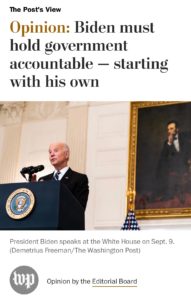By Delaney Marsco, Ethics Counsel, Campaign Legal Center
The public’s trust in government is at near-record lows. While the reasons for the public’s poor view of the government are many, lack of government accountability only adds to the distrust. The purpose of Anti-Corruption Week this month is to shine a spotlight on the much-needed and attainable reforms that can increase government accountability, reduce corruption and begin to restore public confidence.
The factors that contribute to government corruption are not new, but they are peskily resilient: pay-to-play influence and the revolving door between special interests and government; the rise in lobbyist-run agencies; the shattering of norms against conflicts of interest; and blatant examples of self-dealing across the federal government.
The public’s intuition is common sense: the influx of money in politics must be having a corrupting effect on the political process. The rules of the game appear to be rigged to make influence more effective and more secret at the same time. Now, more than ever, it is critical to establish meaningful guardrails to protect the integrity of government to ensure it acts in the public interest. Only then can we hope for the public’s trust in government to improve.
Common sense reforms, like those proposed in Accountability 2021, can fight against these forces that harm our democracy.
To prevent corruption in the federal government and reverse the trend of unfair privileged access and influence by wealthy special interests, the Biden administration must elevate ethics as a core value. Prioritizing meaningful structural ethics reforms and committing publicly to adhere to the rules and values and norms behind them can help us achieve a more accountable government.
Key reforms include:
- Relaunching ethics.gov, so that the public has full, convenient access to all ethics documents. Meaningful disclosure allows the public to scrutinize officials’ financial interests and ensure they are prioritizing the public interest instead of personal gain. Any disclosures must be searchable, sortable, downloadable, and machine-readable.
- Establishing a Lobbying Reform Task Force to make recommendations that will improve lobbying disclosures and require reporting by currently unregistered lobbyists.
- Enforcing and bolstering existing ethics and conflicts of interest laws, including the conflict-of-interest statutes, the Lobbying Disclosure Act, the Foreign Agent Registration Act, and the Hatch Act.
- Appointing someone in the executive branch to oversee the implementation of a bold ethics agenda.
The reforms boil down to a few key principles. First, the public should know what interests are present in government decisions, either through access or based on the past affiliations of government officials. Second, violations of rules against conflicts of interest need to be enforced in meaningful ways. And third, government needs to embrace ethical, conflict-free governance as a core value.
The result would be less corruption and less policy done for secret or private reasons. The public deserves no less. And in time, it might start to trust the government’s integrity again.
The Biden administration has a once-in-a-generation opportunity to embrace and promote these meaningful ethics reforms, and there is no time to waste. In an advocacy letter to the administration this week, accountability advocates will urge Biden to relaunch Ethics.gov and will host a virtual briefing on corruption in government and the recommendations in Accountability 2021 to prevent it.

